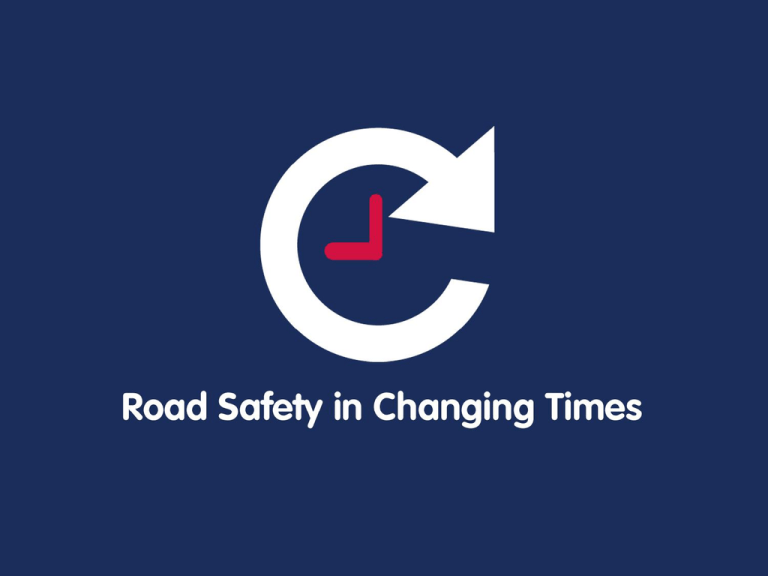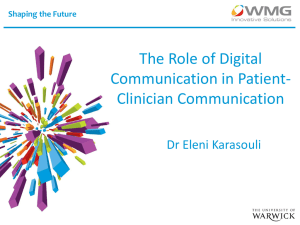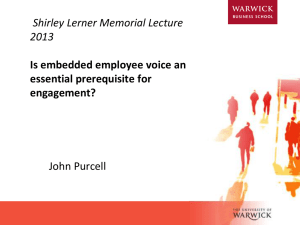
Older drivers
Dr Carol Hawley
Principal Research Fellow & Director of the
Transport and Rehabilitation Research Unit
Warwick University
Dr Carol Hawley
Warwick Medical School
University of Warwick
University of Warwick
DVLA: Any driver aged
70 years or over
Increasing numbers of
older old
ONS Proportion of UK
population aged 65yrs
and over:
1941: 10%
2011: 17%
2021: 20%
2031: 23%
2041: 25%
University of Warwick
Wales on Sunday, 18th September 2011.
“A DVLA spokesman admitted 100- year-old drivers
might have had their licences renewed every three
years from the age of 70 without ever seeing a
doctor.”
“But they insisted the system was safe, saying:
‘They’re obliged, and it’s a maximum fine of £1,000,
to declare any medical conditions they’ve got.’
“Wales’s most senior motorist is a 101 year old man.”
University of Warwick
Always driven – car based
society
Independence
Mobility: increasing level of
services moving away from town
centres and villages
Driving increases self-confidence,
self-esteem and feelings of
autonomy, (Ellaway et al, 2003)
Giving up driving is associated
with an increase in depressive
symptoms (Ra et al, 1997)
Many older drivers feel they are aware of their driving
behaviour and adapt and compensate for alterations caused
by ageing (Musselwhite, 2010; Ball et al, 1998):
◦ Drive more slowly
◦ Avoid motorways
◦ Avoid driving at night
◦ Avoid busy times
◦ Avoid driving in bad weather
◦ Avoid right hand turns across oncoming traffic
◦ Try to avoid driving alone
Driving experience partially compensates for reduced
reaction times
University of Warwick
78% of 70+ year old men hold a full driving licence
41% of women (57% overall 70+ year olds)
Reported accidents:
212,685 in 2010
5% of total (10,465) over 70 yrs old
Killed or seriously injured:
6,506 in 2010
70 – 79 age group: 6% of total (386)
80+ age group: 5% of total (320)
Older drivers not the biggest risk group on the roads
Number of accidents due to medical condition:
unknown
University of Warwick
University of Warwick
US – varies between states
Australia – varies between territories:
E.g. Victoria: no regular testing
But New South Wales: annual medical report from
age 80. Annual road test from 85yrs.
Western Australia: Medical report ages 75, 78, 80
then annually. Annual road test from 85 yrs.
Tasmania: from 7/10/11 ended compulsory annual
driving assessments.
UK – 3 year renewable licence through selfdeclaration from age 70.
University of Warwick
No evidence that
drivers become less
safe at a particular age.
Older driver crash
involvement is related
to high risk subgroups (Hu et al, 1998)
Frailty rather than
general decline in
driving skills is linked
to accidents (Evans,
1991; Maycock, 1997)
“An elderly driver in her 70s landed
her car in a front garden of after
losing control of her Citroen C3. The
garden's roses faired better than its
wall which was completely
demolished. No one was injured in
the incident.” News item 2011
University of Warwick
UK: Onus on driver to decide whether to
restrict or cease driving.
Driver is obliged to declare any medical
condition which may affect driving.
Many older drivers self-regulate their
driving.
DirectGov website (Oct. 2011) clearly
advises drivers to ask a health professional
for advice on FTD.
University of Warwick
1. ‘It may be time to give up driving if you have
a medical condition that may affect your ability
to drive safely – ask your GP for advice.’
2. ‘If you are on prescribed medication, ask
your doctor if it could affect your driving.’
3. ‘If you think your vision is changing, speak
to your optician, GP or specialist.’
4. ‘If you are worried about your fitness to
drive, talk to your GP or health professional.’
University of Warwick
1.
2.
3.
4.
5.
6.
Can’t see correctly (visual impairment)
Can’t think correctly (cognitive impairment
e.g. dementia)
Can’t physically operate a vehicle (physical
disability, frail elderly)
Risk of sudden incapacity (seizures,
hypoglycaemia, cardiac arrhythmias)
Mental incapacity (psychiatric disorders)
Impaired by alcohol or drugs or
medication
Warwick Medical School
DVLA At A Glance Guide for
Medical Practitioners
reproduces GMC advice:
The driver is legally responsible
for informing DVLA about any
medical condition which may
affect safe driving.
If the patient has such a
condition you should explain to
the patient that the condition
may affect their ability to drive.
If the patient is incapable of
understanding this advice, e.g.
because of dementia, you
should inform DVLA
immediately.
University of Warwick
‘If a patient continues to drive when they
may not be fit to do so, you should make
every reasonable effort to persuade them to
stop.’
‘If you do not manage to persuade the
patient to stop driving, or you discover that
they are continuing to drive against your
advice, you should contact the DVLA
immediately and disclose any relevant
information, in confidence, to the medical
adviser.’
University of Warwick
Sounds straightforward, but...
Fewer notifications to DVLA than would
be expected from prevalence of
medical conditions.
Study commissioned by Department for
Transport to investigate the knowledge
and attitudes of health professionals to
giving advice on fitness to drive to
patients
Hawley (2010)
University of Warwick
What do they know?
What do they think?
What do they say they do?
What do they do in practice?
What do patients think?
How can current practice be improved?
University of Warwick
1.
2.
3.
4.
5.
6.
7.
8.
9.
10.
11.
Survey of all UK medical schools
Survey of final year medical students
National survey of knowledge/attitudes – all
HCP groups
Exam style scenarios to test knowledge
Simulated consultations to test behaviour
Patient interviews
Diabetic (Type II) patient survey
In-depth case studies
Focus groups
GP survey
Structured workshops to devise strategies for
change
University of Warwick
All 32 UK Medical Schools surveyed
Unusual to find medical aspects of FTD on a
syllabus
Rarely taught in relation to specific conditions
12 schools (38%) could be an exam question
Survey: 109 final year medical students
Few recall specific training, role of placements
Most know where to find information, but not
when it is needed
University of Warwick
89% think that giving advice to patients on
fitness to drive is important
91% think that HCPs have a duty of care to give
driving advice to patients
60% say their knowledge of Medical Aspects of
FTD is fairly poor
82% think HCPs need more training on FTD
University of Warwick
Acknowledge
it is probably
their responsibility
Other HCPs and other agencies
expect GPs to advise patients
on FTD as the HCP who knows
patient best
Warwick Medical School
epilepsy
cardiovascular
fits/blackouts
neurological
diabetes
stroke
alcohol/drugs
psychiatric
visual impairment
dementia
0
10
20
30
40
50
Warwick Medical School
60
70
80
100%
90%
80%
70%
60%
50%
40%
30%
20%
10%
0%
13
24
16
24
48
64
48
56
57
38
23
28
diabetes
stroke
19
28
14
alcohol epilepsy
Warwick Medical School
visual
over 50%
up to 50%
never
413 HCPs scored 1554
vignettes in which a
patient was either: fit
to drive, unfit to drive
or borderline.
Knowledge of medical
standards was poor.
7% (31/413) HCPs
scored all their
vignettes correctly.
Bias towards rating
patient as fit to drive.
University of Warwick
University of Warwick
3 medical conditions
◦ Transient Ischemic Attack
◦ Diabetes and visual impairment
◦ Depression with alcohol abuse and over-dependence on
diazepam
Male/Female, age 40 or 70
Real Clinician: Primary/Secondary Care setting
Plenty of driving clues....
200 scenarios shown in pairs to 101 HCPs.
. “Lifestyle Advice Study”.
Then interviewed and asked for main concerns,
with 9 further prompts.
10th prompt = “research shows that there are 5 key areas that
patients often ask about: diet, work or hobbies, home, sex,
driving…”.
University of Warwick
University of Warwick
Three quarters of HCPs did not raise fitness to drive
unprompted
On average 12 minutes for respondent to mention
driving as a concern (range = 1 to 28 minutes)
GPs less likely to raise FTD unprompted than
Specialists.
No difference in unprompted advice to older versus
younger patients – equally poor!
One Third of HCPs did not raise driving as an issue
even after 10 prompts.
Only 20% of interviewees volunteered specific driving
advice
University of Warwick
GP
18
consultant
82
43
therapist
67
60
optometrist
40
67
0%
20%
33
40%
main concern
60%
not main concern
University of Warwick
80%
100%
We don’t
“… I suspect we probably don’t unless people
actually say ‘Can I drive?’ ….” (F, urban).
Financial incentive
“You talk to them about alternatives like bus
passes and point out how expensive it is to tax and
insure a car and just how many taxi rides you could
get from a tank full of petrol. (M, urban).
Scare tactics
I challenge them, ‘well what would happen if you
had an accident and killed somebody or injured a
child on a bike’. (M, urban).
University of Warwick
“It is difficult as it is often a confrontational issue.”
(rural)
“In health terms very often you run the risk of
seriously impairing the quality of somebody’s life.
…You have stopped somebody driving and you
could see them six months later with depression
because you have totally destroyed their life.”
(suburban).
”Time constraints, we have 10 minute
consultations and fitness to drive is not really a
health benefit for the patient.” (urban)
University of Warwick
“The GP is the best person because he is the one
most likely to see the whole thing …” (M, GP,
urban)
“…for some people you’re about to take away
their job, their life ... It’s a breaking bad news
barrier but you have got to do it and it’s your job.
(M, GP)
“it isn’t actually by itself a medical issue, it’s a
social issue and there is a tendency in my view in
society to hand the social issues over to the
medical profession.” (M, GP)
University of Warwick
Have you ever notified DVLA?
25% of interviewees said they had, usually only once.
“At the end of the day and once in my life I have done it, I have
informed the DVLA. The DVLA had already informed the patient
that they shouldn’t be driving and they were still driving. That’s a
real end of the road one; there are steps along the way.” (F,
suburban).
How do you check your patient has heeded your FTD advice?
(GPs)
“I’ve got 16,000 patients, I’m not going to spot him driving past
the surgery and say ' I told you to stop driving’.”’ (M, urban)
“I told the patient again he needs to stop driving. He said he
wasn’t going to drive and .. didn’t come back after that. How do I
know? I don’t know.” (M, urban)
University of Warwick
Patients with a medical condition which
clearly contra-indicates driving
Patients raising the issue of driving
themselves
Using the DVLA guidelines to convince
patients of the regulations regarding their
fitness to drive
Access to a mobility centre to which patients
can be referred for a driving assessment
Access to an older driver road safety
assessment scheme.
University of Warwick
breaking bad news
not considering fitness to drive as an issue within the
clinical context
not remembering to discuss driving with patients
assuming that older patients are not drivers
lack of knowledge and complexity of the DVLA
guidelines
patient resistance or denial
concern for the effects of not driving on patient wellbeing or livelihood, mobility around neighbourhood
concern that advising a patient to stop driving may
adversely affect the clinician-patient relationship
University of Warwick
GPs: it probably is our
role to advise on FTD–
but rarely do it.
Hospital Drs: feel it
should be GP who does
it.
Optometrists: it’s our job
to advise on driving, but
we can’t inform DVLA,
can write to GP but don’t
know outcome.
Mobility Centre staff:
importance of driving
assessments, and
enabling driving.
Road Safety Officers:
assessment schemes for
elderly drivers.
Police: unable to identify
medical cause at roadside,
no appropriate
assessments.
“..it would be nice if GP’s had
to inform the DVLA but that’s
going to drive illness
underground, it will prevent
people from seeking
treatment.” (Police FG)
Patients: often unaware of
rules and restrictions, but
often self-limiting.
University of Warwick
Patient Denial
“Even the most intelligent or articulate people have no general idea
of the medical aspect of FTD because most people see themselves as
fit to drive.” (GP)
“We’ve stopped old people going the wrong way down the dual
carriage ways and they don’t realise that they’ve actually done
anything wrong.” (Police)
Dr/patient relationship
“I said 'look you mustn’t drive', and I said if you do continue driving I
will tell the DVLA', he hasn’t spoken to me since.” (GP)
Restricted Licensing especially for older drivers
“I must say I like the idea of adapting licences saying actually you
shouldn’t be driving at night anymore, your eyesight isn’t good
enough for night driving, actually you shouldn’t be driving on
motorways, yes you are safe within a locality, because if you know
the local roads you are probably going to be safer on those.” (GP)
University of Warwick
GPs don’t advise
“I stopped a gentleman from nearly wiping me out as he was
coming towards me, … when I asked him for his driving licence
… he was 102 years of age. When I spoke to his GP, he said ‘I
have been feeling that he hasn’t been quite fit to do so for quite
some time’, what had he done about it? I immediately sent the
form off to DVLA, because I got involved the doctor was willing
to say something, but up until that point he was too reluctant to
do so.” (police)
Visual impairment
There should be rules on [visual] testing after a certain age and
produce evidence to the DVLA, after 55 for instance, and have a
test every three years.” (A & E Doctor)
“I’ve got so many patients hit 70 and they’d thought they’d have
an eye test because they can’t get their ‘ready readers’ strong
enough ... They are supposed to be illegal for driving but people
do it.” (Optometrist).
University of Warwick
Older drivers are not inherently unsafe
Many older drivers will modify driving habits,
particularly if advised to do so
Of all HCPs, GPs are best placed to advise patients on
FTD
Many reasons why advice is not always given
Use existing software to prompt GPs to advise
patients on fitness to drive
Introduce regular visual tests for drivers
Consider restricted licensing for certain medical
conditions and older drivers
Educate drivers, e.g. new Good Egg ‘Older Persons
Guide to Road Safety’
University of Warwick
c.a.hawley@warwick.ac.uk
University of Warwick









